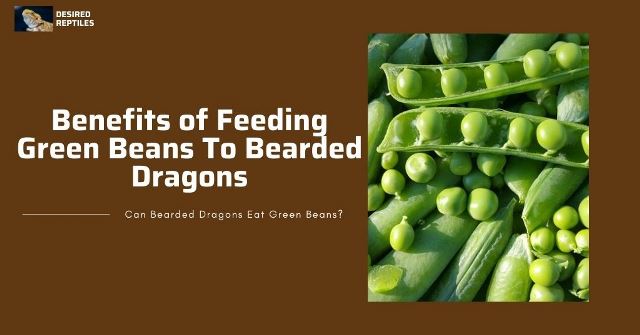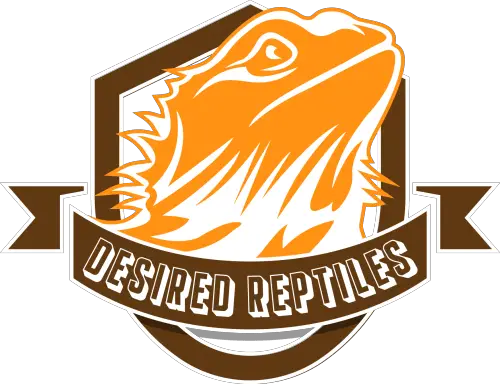Plant-based food contains the majority of the minerals and vitamins required for bearded dragons to grow healthy and protect themselves from diseases. In the wild, beardies rely on spinifex grass and other shrubs in their environment for a balanced diet. These grasses are not anywhere as nutritious as the vegetables beardies eat in captivity, but they’re enough to get them through the roughness of time.
Pet beardies, on the other hand, are blessed with a plethora of vegetables including other plants like fruits, flowers, and herbs with a much higher nutritious value than the shrubs in their natural habitat. However, not all of these nutritious vegetables are safe for your pet. Some of them contain elements that can harm your dragon, so they need to be fed infrequently.
Bearded dragons can eat green beans, but not as a staple veggie. Green beans are fibrous vegetables with a punch of vitamins and minerals that your dragon can benefit from. Yet, they contain levels of phosphorus and oxalic acids that are a little too high for your dragon to eat frequently.
Your beardie may absolutely love green beans and it would be great to feed it some, but you must know how to go about it so that your pet doesn’t fall sick. Let’s get right into it!
Are Green Beans Good For Beardies? – Nutritional Values
There are several vegetables that beardies can be fed safely. Some of those veggies can be fed daily, occasionally, and even rarely. Green beans are good for bearded dragons. They are one of the occasional vegetables that dragons can profit from nutritionally.
Here is a summary of the nutritional value of 100 grams of raw beans according to the United States Department Of Agriculture:
- Carbohydrates: 6.97 g
- Protein: 1.83 g
- Fat: 0.22 g
- Vitamin A: 690 IU
- Vitamin C: 12.2 mg
- Vitamin K: 14.4 mcg
- Thiamin: 0.082 mg
- Riboflavin: 0.075 mg
- Niacin: 0.725 mg
- Vitamin B6: 0.141 mg
- Folate: 33 mcg
- Calcium: 37 mg
- Iron: 1.03 mg
- Magnesium: 25 mg
- Phosphorus: 38 mg
- Potassium: 211 mg
- Zinc: 0.24 mg
Now, this is simply a plain list of values. To interpret this, you’ll have to understand how important the nutrients are to your bearded dragon and what roles they play.

6 Great Benefits Of Green Beans For Your Bearded Dragon
Green beans are highly nutritious and would be a great idea to introduce them to your dragon now and then. Here are 6 ways green beans are good for beardies:
1. Green Beans Can Improve Your Dragons Digestion
The fiber in green beans is a great source of healthy bowel movement. Fiber helps to positively regulate your beardie’s poop consistency by providing a bulk load that either loosens or compresses the digested products. This means that your dragon will have normal poop that it can excrete without huffing and puffing or experiencing unnecessary stomach aches.
Fiber also feeds good gut bacteria that help to digest food and break down bulky chemicals. The more fiber your beardie eats, the more good gut microbes it has, permitting a healthier digestive ride.
2. Green Beans Are Good Sources Of Happy Hormones
The magnesium, zinc, and vitamin B6 in green beans promote the production of serotonin, which can help to improve your beardie’s mood. Although minimal, including green beans in your dragon’s diet can help it to experience a bit of elation. Perhaps you notice that your dragon is stressed from a change of environment or other encounters, a nice salad of green beans and staple veggies may help it to feel better.
3. Green Beans Can Improve The Production Of Red Blood Cells
Elements like iron and folate assist the production of red blood cells and are present and functional in green beans. Iron is a major factor of hemoglobin that helps with the transport of oxygen around the blood. Folate, on the other hand, helps with the direct production of red blood cells in the bone marrow. It also helps in maintaining the cardiovascular health of bearded dragons.
A deficiency of folate can lead to anemia which is highly fatal for beardies. Thankfully, green beans are saturated with folate and iron that your dragon duly needs.
4. Green Beans Help To Improve Your Dragon’s Immunity
Staple vegetables like collard greens and mustard greens are good components of disease-fighting vitamins like vitamins A and C that protect your dragon from illnesses. They help in the production of antibodies that your dragon needs to destroy unwanted organisms that may have made their way into the bloodstream. These vitamins are also found in green beans that work the same way to ensure your dragon doesn’t fall ill easily.
5. Green Beans Contain Anticancer And Anti-Tumor Factors
Antioxidants are organic compounds that help to protect cells from oxidative stress caused by radioactive factors. These factors lead to the production of free radicals which are one of the major causes of abnormal cellular growth like cancers and tumors in bearded dragons. Vitamins C and E have antioxidative properties and can be sourced from green beans which will give your beardie a better chance of handling free radicals in its system keeping it further away from cellular abnormalities.
6. Green Beans Are Good For Your Beardie’s Teeth
Dental hygiene is highly important for bearded dragons. It’s normal for food to get into their teeth and cause problems. That is why it’s advised to feed your dragon crunchy veggies like green beans and carrots to help them break plaque formation and prevent bacteria from settling in. Since your dragon cannot brush its teeth, green beans can be a substitute now and then to keep its teeth clean and bacteria-free!
The Right Way To Feed Green Beans To Your Bearded Dragon
Everything that must be done should be done correctly, especially when your beloved pet is the subject of consideration. Remember that green beans are occasional vegetables. They also are side veggies, not base-level vegetables. This means that you cannot feed them to your beardie every day, and you certainly cannot feed green beans to it only as a whole meal.
Preparation
First and foremost, the vegetables must be fresh. Not canned, dried, or steamed – it should be as fresh as rain! This is because you don’t need the nutritional value to be anything less than it already is. Your dragon may love green beans so much that it would select the beans out of the salad leaving the rest for you to admire. This is why all the nutrients need to be intact in the beans so that your beardie is not at a loss.
After getting the fresh green beans, you have to wash them with clean water so that there are no residual herbicides, pesticides, or fertilizers on them as these are not safe for bearded dragons to consume. Moving on, you can then chop them into smaller sizes – small enough to fit between your dragon’s eyes – to prevent any choking hazards or impaction from happening to your pet.
Don’t forget the calcium supplements! (view on Amazon) It’s highly advisable for pet beardies to have calcium powder on standby and added to their salads daily.
Feeding
Your adult bearded dragon should eat at most 2 strings and baby beardies only one string of green beans chopped into smaller pieces added to its salad. This should make up about 20% to 30% of your beardie’s salad. You must ensure that it doesn’t exceed this amount.
In terms of frequency, adult beardies can eat green beans once or twice a week. For baby beardies, it should be added to their salad only twice a month. It’s already a hassle getting baby bearded dragons to eat vegetables and they eat very little of the salad when they do, so it’s important to make every bite count. Thus the reason why occasional vegetables like green beans should be as infrequent as possible for babies.
Why Is It Bad For My Beardie To Eat Green Beans Daily?
The difference between phosphorus and calcium in green beans is only 1mg, with calcium at 37 mg and phosphorus at 38 mg, it’s still not ideal for dragons. The ratio must be 2:1 for calcium and phosphorus for your dragon to eat daily.
In addition to the phosphorus in the beans, there is also oxalic acid, slight but present. Combined with phosphorus, they make a notorious pair for bearded dragons.
Phosphorus and oxalic acid are calcium-binding elements that can shorten the calcium that your dragon needs for itself. If the phosphorus or oxalic acid is too high, it may even prevent any calcium from getting used by your pet so much that it would start to utilize the calcium from its bones instead.
This of course depletes the health and density of the entire skeletal system leading to a metabolic bone disease that is correctable if noticed early, but fatal when severe. MBD causes the bones to be so brittle that they deform, break, and press on the organs of the infected dragon, sometimes disabling them from breathing. It’s a very painful experience for beardies to endure and should be avoided at every possible cost.
Metabolic bone disease can be effectively prevented by including calcium supplements (view on Amazon) in your beardie’s daily meals. Phosphorus plays a few beneficial roles in beardies, so you can’t and shouldn’t avoid feeding your beardie vegetables with detectable phosphorus completely. As long as calcium is greater than phosphorus or oxalic acid, your pet will be safe from the dangers of MBD.
Are There Other Alternatives To Green Beans That I Can Feed My Beardie?
Your pet beardie can eat several other occasional vegetables that provide similar benefits to green beans. Here’s a list of them:
The Conclusion
Green beans are relatively safe for your bearded dragon to consume, as long you feed the beans to it correctly. With all that has been discussed, you should be an expert in feeding green beans to your beardie. If you find that your pet is refusing to eat the beans, it could be that they’re not its favorite vegetables. You can try other veggies till you find the one your dragon enjoys. Ensure that the veggies on trial are safe for it to consume so that you don’t endanger your pet. Good luck!
